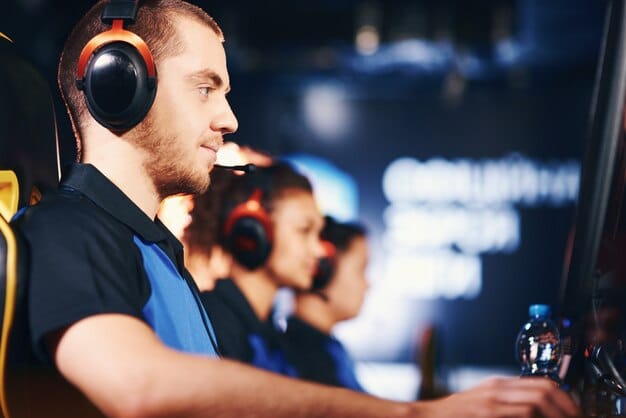Esports Olympic Future: By 2032?

The potential inclusion of esports as an Olympic sport by 2032 hinges on overcoming significant hurdles, including defining what constitutes a “sport,” addressing intellectual property rights, and navigating the industry’s rapid evolution and diverse ethical considerations, making its path to the Games complex yet intriguing.
The convergence of traditional sports and digital gaming has ignited a fervent debate: The Future of Esports: Will It Be an Olympic Sport by 2032? This isn’t merely a speculative question but a complex inquiry involving cultural shifts, technological advancements, economic considerations, and fundamental definitions of sport. As esports continues its meteoric rise, its potential inclusion in the Olympic Games carries profound implications for both realms.
The Meteoric Rise of Esports: A Global Phenomenon
The journey of competitive video gaming, or esports, from niche pastime to global spectator phenomenon has been nothing short of extraordinary. What began with arcade challenges and local tournaments has blossomed into a multi-billion dollar industry, attracting millions of viewers and generating significant revenue. This rapid ascent underscores a fundamental shift in entertainment consumption and competitive aspirations. Understanding this trajectory is crucial when considering its Olympic prospects.
The growth is evident in viewership numbers, prize pools, and dedicated infrastructure. Major tournaments now fill arenas typically reserved for traditional sports, broadcasting to global audiences via streaming platforms. This widespread engagement challenges conventional notions of what defines a competitive activity. The sheer scale and professionalization seen within esports leagues are compelling arguments for its legitimate status as a global sport, attracting high-caliber talent and dedicated fan bases.
Defining Sport in the 21st Century
The core of the Olympic debate often revolves around the definition of “sport.” For centuries, this term has been intrinsically linked to physical exertion, skill, and human performance against other athletes or nature. Esports, primarily digital, challenges this traditional understanding directly.
* 🎮 Physicality vs. Mental Acuity: Traditional sports emphasize physical prowess, while esports demands unparalleled mental agility, strategic thinking, and fine motor skills.
* 📊 Historical Context: The Olympics have evolved, incorporating sports like shooting and curling that are less physically demanding but require immense precision and strategy.
* 🖥️ Digital vs. Analog: The shift from physical arenas to virtual ones redefines the playing field, making the “sport” less about a body’s physical output and more about cognitive processing and intricate hand-eye coordination.
The discussion now compels us to consider whether intellectual and strategic competition, executed through digital means, aligns with the Olympic spirit. Many argue that the intense training, discipline, teamwork, and competitive drive present in esports are indistinguishable from those in revered Olympic disciplines. This re-evaluation of “sport” is fundamental to the dialogue surrounding esports’ future.
Olympic Aspiration: Criteria and Challenges
For esports to be considered for the Olympic Games, it must align with the International Olympic Committee’s (IOC) stringent criteria, which encompass far more than just athletic merit. The path is fraught with complex challenges ranging from game selection to ethical considerations. The IOC’s current stance, while evolving, outlines specific requirements that esports must meet to conform with the Olympic charter and values.
One significant hurdle is the lack of a single governing body for esports, unlike traditional sports overseen by federations. The decentralized nature of esports means that different games operate under distinct publishers and rules, complicating any uniform approach to governance. This fragmentation makes it difficult to establish consistent oversight regarding anti-doping, fair play, and participant welfare—all critical for Olympic inclusion.
Intellectual Property and Game Publishers
A unique aspect of esports is that the “field of play” is proprietary software, owned by game publishers. This presents a massive intellectual property (IP) challenge for the IOC.
* 🔒 Ownership Rights: Publishers control game modifications, updates, and competitive formats, which could clash with the IOC’s desire for consistent rules and long-term stability.
* 🤝 Partnership Models: Any Olympic integration would require unprecedented collaboration and agreement between the IOC and multiple large, private companies, each with their own commercial interests.
* 📈 Evolving Titles: Unlike traditional sports with stable rules, esports games frequently change with patches and new versions, potentially altering competitive balance and viewer experience, a concern for Olympic regularity.
The commercial interests of these publishers are paramount, and their willingness to concede control or adapt their titles for an Olympic format remains a significant negotiation point. The IOC would need assurances that the games selected would be stable and accessible for training and competition over a multi-year cycle, a challenge given the rapid innovation cycle in the gaming industry.
Ethical Considerations and Player Welfare
Beyond the technicalities, profound ethical and welfare issues must be addressed. The IOC’s commitment to athlete well-being and fair play extends to all participants.
* 💊 Doping and Performance-Enhancement: While not physical in the traditional sense, stimulants or other cognitive enhancers could be used, necessitating robust anti-doping protocols tailored to esports.
* ⚖️ Age Restrictions and Mental Health: Many top esports players are young, raising concerns about their mental health, educational development, and protection against exploitation.
* 🎮 Game Content: The violent nature of many popular esports titles (e.g., first-person shooters) conflicts with the Olympic values of peace and mutual understanding. The IOC has indicated a preference for non-violent, simulation-based titles.
These issues require careful deliberation and the implementation of robust frameworks to ensure participant safety and uphold the integrity of the Olympic movement. The integration of esports into the Olympic ecosystem would necessitate a re-evaluation of existing policies and the development of new ones specifically for this unique competitive landscape.
Defining the “Olympic Game”: Which Titles Qualify?
The selection of specific esports titles for potential Olympic inclusion is a contentious and complex issue. Unlike traditional sports where the rules and equipment are relatively standardized, esports comprises a vast array of genres, each with its own unique mechanics, player bases, and competitive scenes. The IOC has a clear preference for content that aligns with its established values and audience appeal.
The sheer diversity of esports titles makes universal adoption impossible. Publishers like Riot Games (League of Legends), Valve (Dota 2, CS:GO), and Epic Games (Fortnite) operate independently, and their games cater to different demographics and competitive styles. This fragmentation means that any “Olympic Game” selection would inevitably exclude vast portions of the esports community, potentially alienating both players and fans.
The IOC’s Stance on Game Content
The IOC has expressed a strong, clear stance on the nature of games they would consider suitable for the Olympic program. Their preference leans heavily away from titles with a focus on violence or depictions of war.
* 🌐 Non-Violent & Simulation-Based: The IOC explicitly favors games that simulate traditional sports (e.g., FIFA, NBA 2K), racing games (e.g., Gran Turismo), or strategy games that are not linked to violent themes.
* 🕊️ Alignment with Olympic Values: The core Olympic values of peace, friendship, and fair play are considered paramount. Games promoting aggression or warfare are seen as directly contradictory to these principles.
* 🎮 Accessibility & Universality: Ideally, chosen games would have broad appeal and be accessible globally, not tied to specific cultural or national narratives beyond the competitive aspect itself.
This position puts many of the most popular esports titles, such as League of Legends, Dota 2, Counter-Strike: Global Offensive, and Call of Duty, at a significant disadvantage for Olympic inclusion. Their depiction of violence, even if stylized, directly conflicts with the IOC’s criteria. This creates a dilemma: include less popular, “IOC-friendly” titles and risk alienating the core esports audience, or stand firm on values and limit the potential for integration.
Popularity vs. Principles: A Balancing Act
The conflict between the popularity of certain violent games and the IOC’s ethical principles is a major stumbling block. The most watched and highest-earning esports titles often involve combat.
* 💰 Commercial Appeal: Games like League of Legends and CS:GO drive enormous viewership and generate substantial revenue, reflecting a passionate global fanbase.
* 🤔 Philosophical Divergence: The IOC’s reluctance to embrace these titles highlights a fundamental philosophical difference concerning the role of violence in sport and entertainment.
* 📈 Growth vs. Image: While integrating the most popular titles would offer massive audience potential, it could also damage the Olympic brand’s image if seen as endorsing violent content.
This “popularity vs. principles” debate forces a difficult choice. The IOC could push for bespoke, non-violent versions of popular games, but this would require significant cooperation from publishers and buy-in from the competitive scene, which thrives on the established versions of their games. Alternatively, they could focus exclusively on sports simulations, which might garner less overall esports viewership but align perfectly with their brand.

The Road to 2032: Milestones and Hurdles
The journey for esports to potentially become an Olympic sport by 2032 is paved with numerous milestones that need to be met and significant hurdles that must be overcome. This isn’t a singular event but a continuous process of evolution, adaptation, and negotiation between various stakeholders. Each step requires meticulous planning, substantial investment, and, crucially, a shift in perception from both the traditional sports world and the esports community.
Achieving inclusion requires more than just meeting criteria; it demands a cultural bridge between two distinct competitive ecosystems. The esports world operates with a speed and fluidity that often contrasts with the more traditional, bureaucratic structures of the Olympic movement. Bridging this gap will require both sides to be flexible and open to new paradigms.
Testing the Waters: Recent Collaborations and Events
The IOC is not entirely new to esports. They have been “testing the waters” through various initiatives and collaborations, recognizing the immense potential of digital entertainment.
* 🎮 Olympic Virtual Series (OVS): Launched in 2021, the OVS was the IOC’s first licensed event for virtual sports, featuring games like cycling, rowing, sailing, baseball, and motorsport simulations.
* 🌍 Esports Forums and Summits: The IOC has hosted several esports forums, bringing together key stakeholders from the gaming and sports worlds to discuss integration possibilities.
* 🤝 Partnerships with Federations: Some International Federations (IFs) for traditional sports have already embraced esports, launching virtual versions of their sports or integrating esports elements into their events.
These initiatives are crucial as they provide a low-stakes environment for the IOC to learn about the complexities of esports, understand its audience, and assess the feasibility of integrating it into the Olympic framework. They also allow the esports community to engage directly with Olympic officials, fostering mutual understanding and collaboration. While small steps, they indicate a clear direction of interest from the traditional sports body.
Key Milestones for Olympic Inclusion by 2032
For esports to realistically make it into the 2032 Games, several critical milestones would need to be achieved in the coming years. This demands a clear roadmap and concerted effort.
* Governance Structure: Establishment of a recognized, independent, and overarching international governing body for Olympic-compatible esports, capable of implementing standardized rules, anti-doping policies, and athlete welfare programs.
* IP Rights Agreement: Comprehensive agreements with game publishers securing long-term rights for specific titles, ensuring stability and control over competitive formats for Olympic purposes.
* Youth Engagement: Demonstrated appeal to a global youth audience, showcased through viewership, participation, and positive engagement metrics, aligning with the IOC’s goal of remaining relevant to younger generations.
* Ethical Compliance: Clear and actionable policies addressing ethical concerns, including player health, age appropriateness, background checks, and the exclusion of titles promoting violence or discrimination.
* Successful Pilot Events: Continued successful execution of diverse esports events under Olympic auspices, building on the OVS, potentially including demonstration events at future Games (e.g., Paris 2024 or Los Angeles 2028).
Achieving these milestones is ambitious, particularly given the dynamic nature of both the esports and Olympic landscapes. Each milestone requires extensive negotiation, financial commitment, and the ability to adapt to unforeseen challenges. The 2032 timeframe is tight but not impossible, provided all stakeholders commit to a shared vision and expedited progress.
The Transformative Impact of Olympic Inclusion
Should esports achieve Olympic status, the implications would be profound, reshaping both the gaming industry and the traditional sports landscape. This isn’t merely about adding a new category; it’s about legitimizing a global phenomenon on the world’s most prestigious sporting stage, triggering a ripple effect across multiple sectors. The change would encompass financial influx, shifts in perception, and new opportunities for athletes and organizations alike.
The cultural impact alone would be immense. Olympic inclusion would undoubtedly elevate esports into the mainstream, introducing it to a massive global audience unfamiliar with competitive gaming. This exposure could attract new fans, sponsors, and investors, accelerating the industry’s growth beyond its current trajectory. It would also further blur the lines between digital and physical competition, potentially inspiring new hybrid forms of sport.
Legitimization and Mainstream Acceptance
Olympic inclusion would provide an unparalleled level of legitimization for esports, elevating its status from niche entertainment to recognized athletic competition.
* 🚀 Increased Credibility: Being part of the Olympics would lend unmatched credibility to esports as a serious competitive endeavor, attracting government support, educational programs, and institutional investment.
* 📺 Broader Audience Reach: The global reach of the Olympic Games (billions of viewers) would expose esports to an entirely new demographic, far beyond its current fanbase, boosting viewership and participation.
* 💡 Changing Perceptions: It would challenge traditional views of sport, helping to shed the stereotype of gaming as a mere hobby and instead highlight the intense skill, dedication, and teamwork required.
This mainstream acceptance would also likely lead to better infrastructure for esports athletes, including dedicated training facilities, improved health and wellness programs, and potentially even government funding or scholarships. The professionalization that would follow could transform the career prospects for aspiring esports players.
Commercial & Financial Implications
The commercial and financial repercussions of Olympic inclusion would be staggering, opening new revenue streams and investment opportunities.
* 💰 Sponsorship & Advertising: Olympic association would attract major global brands traditionally tied to conventional sports, leading to lucrative sponsorship deals that dwarf current esports investments.
* 📺 Media Rights: The value of media rights for Olympic esports events would be immense, drawing in major broadcasters and streaming platforms, generating substantial revenue for all parties involved.
* 📈 Investment & Infrastructure: Increased investment would flow into esports organizations, teams, and infrastructure, fostering greater innovation, technology development, and professional growth within the ecosystem.
The economic boost wouldn’t just benefit game publishers and top-tier teams; it would also trickle down to grassroots initiatives, talent development, and ancillary businesses supporting the esports ecosystem. Publishers, eager to be part of the Olympic movement, might invest more in community building and talent pipelines, ensuring a sustainable talent pool for future generations of players.

Beyond 2032: The Long-Term Vision
Even if esports does not make it into the 2032 Olympic Games, the current trajectory and ongoing conversations suggest that its integration into major international multi-sport events is a matter of “when,” not “if.” The discussions surrounding 2032 are merely a precursor to a longer-term vision where competitive gaming solidifies its place in the global sporting landscape. The world of sports is continuously evolving, and esports embodies a significant part of that evolution, catering to a new generation of athletes and fans.
The evolution of technology will continue to play a pivotal role, creating new game genres, evolving competitive formats, and enhancing the spectator experience. Virtual reality (VR) and augmented reality (AR) could introduce entirely new dimensions to esports, blending physical and digital realms in ways we can only begin to imagine. This ongoing innovation will ensure that esports remains dynamic and relevant for decades to come, constantly presenting new opportunities for integration into traditional sporting events.
The Evolution of Sports and Entertainment
The very definition of “sport” is fluid and constantly evolving. Historically, new sports were often met with resistance before gaining mainstream acceptance.
* 🌐 Adaptation to Modernity: Just as sports like snowboarding and skateboarding were once considered “alternative” but found their place in the Olympics, esports represents the physical and mental demands of the digital age.
* 🎭 Merging Disciplines: The line between traditional sport, entertainment, and technology is blurring. Esports exemplifies this merger, offering a compelling blend of skill, drama, and narrative.
* 📈 Future-Proofing the Olympics: For the Olympic Games to remain relevant to younger generations, embracing new forms of competition that resonate with digital natives is essential. Esports offers a pathway to future engagement.
This long-term perspective suggests that the Olympics must continue to innovate to stay relevant. Remaining open to transformative movements like esports ensures that the Games continue to reflect global interests and technological advancements. The discussion about 2032 is a stepping stone—a testing ground for what could become a significant part of the Olympic future.
A Hybrid Future: Olympic Movement Embracing Digital
The most likely scenario is not a complete takeover but a hybrid future where the Olympic movement selectively embraces digital sports. This could involve various levels of integration.
* 🤝 Dedicated Digital Games: The creation of a separate “Digital Olympic Games” or an esports equivalent, running parallel to or in conjunction with the traditional Games, perhaps every two or four years.
* 🎮 Integration of Simulation Sports: Continued inclusion of sports simulation titles (e.g., virtual cycling, rowing, baseball) directly within the main Olympic program, as they directly mimic physical sports.
* 💡 Cross-Disciplinary Events: Hybrid events that combine elements of physical and digital competition, fostering innovation and attracting diverse talent pools.
* 📈 Educational and Developmental Programs: Increased investment in programs that promote digital literacy, healthy gaming habits, and pathways for aspiring esports athletes, aligning with Olympic values of youth development.
This pragmatic approach would allow the IOC to capitalize on the massive appeal of esports while mitigating the challenges associated with game content, intellectual property, and governance. It represents a flexible strategy for integrating The Future of Esports: Will It Be an Olympic Sport by 2032? into a broader, evolving Olympic vision without compromising the core values and traditions of the Games. The journey is complex, but the destination—a more inclusive and modern Olympic movement—seems increasingly within reach.
| Key Point | Brief Description |
|---|---|
| 🎮 Definition of Sport | Esports challenges traditional sport definitions, emphasizing mental skill over physical exertion. |
| ⚖️ IP & Governance Issues | Proprietary game ownership and fragmented governance are major hurdles for Olympic integration. |
| 🕊️ IOC Content Preferences | IOC favors non-violent, simulation-based games aligning with Olympic values, creating selection challenges. |
| 🚀 Long-Term Outlook | Even if not by 2032, a hybrid future with digital sports integrated into the Olympic movement is likely. |
Frequently Asked Questions About Esports and the Olympics
Esports refers to organized, competitive video gaming. Its consideration for the Olympics stems from its global popularity, professionalization, and the high level of skill, strategy, and teamwork displayed by its athletes. It attracts millions of viewers and participants, aligning with the Olympic goal of engaging diverse audiences and embracing evolving forms of competition.
Key obstacles include defining what constitutes a “sport” in the Olympic context, addressing intellectual property rights with game publishers, establishing a unified international governing body, and ensuring selected games align with Olympic values of non-violence and fair play. Ethical concerns like doping and player welfare also present significant challenges.
The International Olympic Committee (IOC) has indicated a strong preference for non-violent, simulation-based games (e.g., sports simulations, racing games) that align with Olympic values. Therefore, highly popular games featuring violence, like League of Legends or CS:GO, are unlikely to be included in their current forms due to content concerns.
Olympic inclusion would bring immense legitimization, mainstream acceptance, and increased credibility to esports. It would open doors to massive new audiences, attract significant commercial sponsorships and media rights, and foster greater investment in infrastructure and professional development for esports athletes globally, ultimately benefiting the entire industry.
The IOC has actively explored esports through initiatives like the Olympic Virtual Series (OVS) and various esports forums. These serve as pilot programs to understand the industry, test formats, and gauge audience interest. While not full Olympic inclusion, these collaborations demonstrate their clear interest in integrating digital and virtual sports into their future vision.
Conclusion: The Digital Arena Beckons
The question of whether esports will become an Olympic sport by 2032 remains open, balancing on a knife-edge between immense potential and significant hurdles. While the trajectory of competitive gaming is undeniable, its integration into a traditional institution like the Olympics is fraught with complex challenges ranging from governance and intellectual property to ethical alignment and game content. The IOC’s cautious but consistent engagement through initiatives like the Olympic Virtual Series signals a genuine willingness to adapt. Ultimately, the future may not be about a wholesale absorption of all esports but rather a selective, hybrid approach that embraces digital competition in forms that resonate with the Olympic spirit. The digital arena is indeed beckoning, and its full embrace by the world’s most prestigious sporting event appears increasingly inevitable, if not by 2032, then shortly thereafter.





